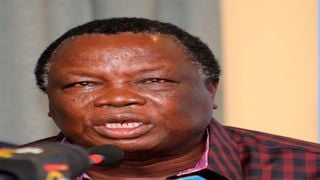
Central Organization of Trade Unions (Cotu) Secretary-General Francis Atwoli.
| Lucy Wanjiru | Nation Media GroupOur Columnists
Premium
Why top unionist Atwoli accused senior NMG editors of ‘blackmail’
A photo of Francis Atwoli dominates the front page of Monday’s Daily Nation. The Cotu secretary-general is sporting a dark beige epaulette shirt emblazoned with the letters “SG”. He is pictured in a speaking pose, clasping a mike and a notebook. His hands are adorned with rings on each finger of the right hand except the thumb and index finger. He also wearing what looks like a gold watch and chain.
Printed below the picture are the words “End of an era?” and the big headline, “Death of trade unions”.
American showman Phineas Barnum once said, “All publicity is good publicity.” But Dr Atwoli—yes, he was awarded an honorary doctorate by Masinde Muliro University in 2018—is not buying the theory.
He cries foul and calls upon the Media Council of Kenya and Kenya Editors Guild to “reign in on the rogue senior newspaper editors who continue blackmailing organisations and individuals through misleading stories that sell terror and fear when their demands are not met”.
Blackmail
This is a serious accusation. Let’s unpack it. First, he says the senior editors are “rogue”, meaning they are dishonest and unprincipled. Secondly, they “blackmail”, meaning they demand payment or other benefit in return for not publishing damaging information. Thirdly, they publish “misleading stories when their demands are not met”. In short, they demand bribes or else!
Preposterous claim
What Dr Atwoli is telling us is that there are senior editors who walk up to people and tell them: “My name is So-and-So, I’m a senior editor of the Nation. Bribe me or else!” It’s a preposterous claim.
This is not to deny that there are journalists who are bribed. NMG has a zero tolerance for corruption. However, Dr Atwoli’s accusation is not helpful. He doesn’t name any editor; the accusation lacks specificity and particularity, let alone evidence.
True, the Nation story published on Monday has its faults—which Dr Atwoli should have zeroed in instead of making a blanket accusation of corruption. The first and most obvious one is the headline, “Death of trade unions”. On the face of it, it is inaccurate.
Trade unions are far from dead, as evidenced by stories covered by the Nation recently. Examples: “Avert doctors’ strike” (DN, Sept. 14, 2023), “TSC and teachers unions begin talks over salary review” (DN, Aug. 22, 2023), “Nurses, clinical workers issue 2-week strike notice budgets” (DN, June 30, 2023), “Meru health workers threaten to strike over promotions” (DN, June 26, 2023) and “Civil servants vow to stage strike amid 3 per cent housing tax row” (DN, May 08, 2023).
The “death headline” can only be justified if it’s meant to be hyperbole and readers understand it to be so. But why exaggerate?
The second fault is that the story is incomplete. Dr Atwoli is not interviewed to respond to the “death” claims. He is interviewed only after he complained. Also, the story does not cover responses from workers. Their views are only included in the second story. Even then, they are perfunctory. “But workers contacted by the Nation said that the unions representing them were facing challenges, mainly because they were being silenced by employers,” the story says. But only two unnamed workers —a teacher and a doctor—are interviewed in the story.
The third fault is that the story uses weak arguments to prove that the unions “have lost their spark and are a pale shadow of their pioneers”—such as the fact that Labour Day celebrations on May 1, 2023 “recorded the lowest turnout in history” and the length of time it takes to implement CBAs, as well as the disappearance of paralysing strikes.
Dialogue
Dr Atwoli explains in the second article published on Tuesday, “Trade unions still fighting for workers, says Cotu boss Francis Atwoli”, that the unions remain committed to defending workers while recognising that Kenya is facing economic challenges. “We firmly believe in the principles of social dialogue, tripartism and peaceful conflict resolution. We recognise that our role as a responsible trade union is to engage constructively with government, employers and other key stakeholders to advance the rights and interests of workers,” he says.
If Dr Atwoli had been given the chance to say in the first article what he says in the second after-thought article, he probably wouldn’t have accused senior editors of blackmail. And readers would have enjoyed an enriched story on Day One.
The Public Editor is an independent news ombudsman who handles readers’ complaints on editorial matters including accuracy and journalistic standards. Email: [email protected]. Call or text 0721989264





